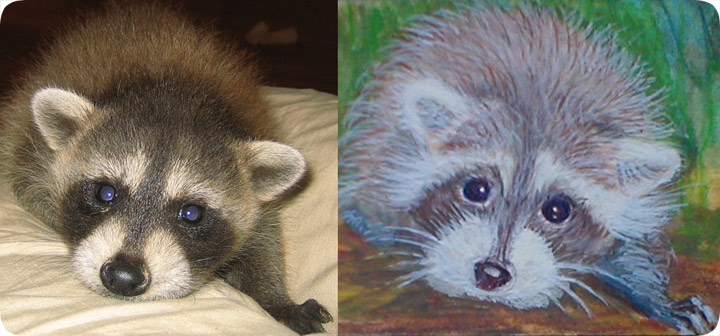-
info@aaanimalcontrol.com
Call us for help in your town
Humane Wildlife Education
Raccoon Drawing

11.11.2007 - A couple of years ago I rescued a baby raccoon, as I commonly do. I put the photos of this raccoon on my website, as I also commonly do. The photos are located here cute baby raccoons if you want to see them.
Anyway, a nice lady named Susan Smith wrote to me and asked if she could use my photos as inspiration to paint some wildlife pictures, and I said of course. I thought nothing of it until months later, when she emailed me a nice scan of a painting that she
made out of one of my photos. I have put her painting and the original photo side by side for comparison. I do admit that I like the look of the original raccoon better. I think that baby raccoons are the cutest animals in the world. Her drawing, with the
large, watery eyes made the animal look a bit more vulnerable, but the truth is that baby raccoons can often defend themselves if they need to. Of course, they usually don't need to, because big bad mama raccoon is always nearby to protect them. Anyway, I thought
I'd post an example of Susan's painting, and I think she sells prints on Ebay if you'd care to search for them and buy them.
Do it yourself: Visit my How To Get Rid of Raccoons page for tips and advice.
Get professional help: Visit my Nationwide Pro Directory of wildlife removal experts.
Raccoon information - If you're looking for raccoon information there are many different resources on the Internet that can help you. The best information is not going to be on a website about personal success stories with removing raccoons
or trapping raccoons; too many people can put nonsense on the internet and play it off like it's the truth. The most reliable information is going to be on a government website or a well-known encyclopedic website. If you're looking for
information about how to get rid of a raccoon, a wildlife removal website will give you a little background on the animal as well as hints and tips about how to get rid of the pest. You'll quickly learn that an extermination site does not
always mean a wildlife professional's site. There are a number of underhanded exterminators out there, making money off the public by going in, killing large numbers of pests, and leaving without addressing the real issues around the property.
A good website will define the animal, detail its behaviors, walk you through the trapping process, and tell you why you're having a problem in the first place.
For more wildlife stories, click my Wildlife Blog
or click my below banner to hire a local trapper.
Raccoons are known to have a wide variety of diets. From meat to grains, you can spot a raccoon eating just about anything. Nursing mothers, especially, have great appetites. This is to provide her litter of cubs with as many nutrients as needed since the cubs only begin eating solid food from 8 to 9 weeks after birth.
Things You Should Know About Raccoon Mating:
Single Partner Versus Multiple Partners
Raccoons practice both single partners and multiple partners when mating, only that it is according to gender. The female raccoon mates with only one male raccoon, who then avoids every other male raccoon after that. While the male raccoon attempts to mate with as many females as it can, during the mating period.
Raccoon Mating
Female raccoons begin engaging in mating from their very first year and they can reproduce from age one. Whereas, the male raccoon does not participate in its first mating season, but rather sits it out because of the older males around. The male raccoon is only able to engage in mating during the second mating season when it is around two years of age.
Breeding Season
For raccoons, there is only one season per year for breeding to take place and it occurs between January and June, with the peak breeding hitting from March through April. This is because raccoons are better able to breed as the weather gets warmer. Raccoons have been observed to give birth 9 weeks after mating. However, if a female raccoon doesn't get pregnant within the breeding timeline, it will have to wait an extra four months.
Gestation
Raccoons have a gestation period of 65 days and most of it is spent forming a den that is safe, warm, and hidden from disturbances. The pregnant raccoons more commonly target hollow trees, attics, chimneys and under homes to build their dens. The focus is on getting a place safe enough to keep the cubs, as the cubs will remain there with the mother for up to 7 weeks after birth.
Single Mother Status
Raccoons are gender-specific animals, meaning they move according to gender. This is further reflected in the way baby raccoons are reared. The mother assumes full responsibility for her cubs. From finding or building a den for the cubs to scavenging for food for the cubs, all the way to protecting and raising the cubs, the mother does it all. Male raccoons, on the other hand, retire to their dens after mating and have no contribution to the survival and rearing of the baby raccoons.
Raccoon Rearing
Raccoons can birth a litter of 7 cubs at once, though most raccoons birth an average of 4 cubs. These cubs are born blind and deaf and remain so for their first three weeks of life. During this period, they are completely dependent on their mother and are immobile until they reach 8 to 10 weeks of age, at which age they also begin eating solid food. These cubs get weaned at 4 months old but remain with their mother till they reach 13 to 14 months old.




















